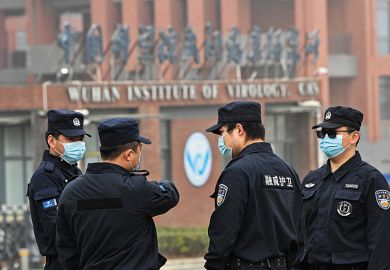One of the front runners to become Germany’s next chancellor has given a full-throated defence of scientific expertise, and said politicians needed to rally round researchers when they were “attacked and defamed”.
Armin Laschet, chancellor candidate for the conservative Union in September’s election, also stressed that he wanted to give universities more autonomy and release them from “unnecessary shackles”.
Currently prime minister of the populous western state of North Rhine-Westphalia, Mr Laschet earlier this year took over the leadership of Germany’s Christian Democratic Union (CDU) from Angela Merkel, who will step down as chancellor when a new government is formed after the election.
Despite a bruising recent leadership challenge and a dip behind the Greens in polling, Mr Laschet still has a decent chance at winning the chancellorship later this year in coalition with other parties.
Although he is not known for strong views on research and higher education, Mr Laschet warned of “currents in society that deny the status of well-founded scientific findings, and present them as the mere opinion of a dubious elite”.
“This becomes clear with the example of climate change, as well as those who simply want to think away the coronavirus in a twisted way,” he said, speaking at an event to mark the 150th anniversary of RWTH Aachen University – based in Mr Laschet’s home town.
“It is important that we clearly stand by scientists, who are sometimes attacked and defamed,” he told attendees.
He stressed that “scientific knowledge” must remain the “most important compass of our society”.
“This compass is not infallible, but it is the most reliable one we have,” he said.
The pandemic has raised repeated questions over the extent to which politicians should follow scientific advice – and which scientists they should heed. Germany has been no exception.
In the early months of the outbreak, Mr Laschet sought to strike a balanced tone, stressing that, while he respected virologists warning of exponential growth, he had to weigh this against the psychological, economic and educational harm of lockdowns.
But in late April 2020, he complained about what he saw as escalating lockdown demands from scientists, and said it was made difficult for politicians when scientific opinion “changed every couple of days”.
Critics said that this misunderstood the scientific process, which is composed of multiple opinions and always changing.
As federal chancellor, his power to reshape German universities would be constrained by the fact that higher education is still largely a state matter.
But Mr Laschet stressed during the RWTH Aachen event that he was keen on “respecting scientific autonomy” and avoiding “unnecessary shackles” on universities, for example through “excessive bureaucracy”.
In 2006, North Rhine-Westphalia passed what is known as the Higher Education Freedom Act, giving universities more legal autonomy and shaking up management structures.
Register to continue
Why register?
- Registration is free and only takes a moment
- Once registered, you can read 3 articles a month
- Sign up for our newsletter
Subscribe
Or subscribe for unlimited access to:
- Unlimited access to news, views, insights & reviews
- Digital editions
- Digital access to THE’s university and college rankings analysis
Already registered or a current subscriber?








